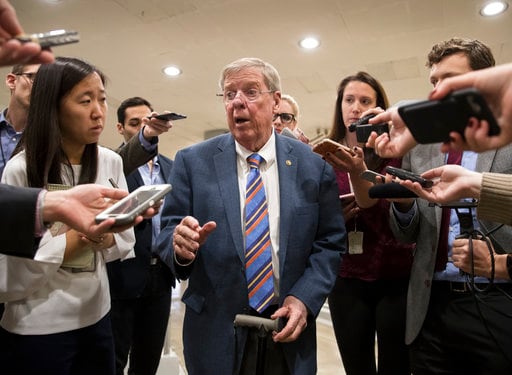Hopes for a bipartisan plan to overhaul the Veterans Affairs community care health programs were derailed in the House on Tuesday, in part, by the unconnected, controversial tax reform plan championed by congressional Republicans.
The VA legislation did pass the committee by a party line vote of 14-9 and is expected to come for a full chamber vote in early 2018. It would create a new permanent program for veterans to seek medical care outside the VA system at government’s expense, similar to a proposal pending in the Senate and another backed by VA leadership.
All of the Democrats on the committee were listed as co-sponsors of the legislation and in recent weeks had praised the measure as a responsible step forward balancing medical care access for veterans with the health care management role of VA physicians.
But most of that support came before the official Congressional Budget Office cost estimate for the measure — $39 billion over five years — and before the contentious tax reform debate on Capitol Hill.
That measure, an overhaul of a host of tax brackets and exemptions expected to cost $1.5 trillion, has drawn the ire of Democrats who accused their Republican colleagues of hypocrisy for demanding offsets for program spending while ignoring the costs of their tax reform plan.
“When we come back again next year, and the deficits are there, and the money is not, you’re going to ask yourselves are you going to cut that care, are you going to move (those programs) out of VA or are you going to ask the taxpayers to pay more,” said committee ranking member Rep. Tim Walz, D-Minn.
During the nearly two-hour-long hearing, Democrats repeatedly returned to the issue of the cost of the tax reform plan over the objections of committee Chairman Phil Roe, R-Tenn., and other Republican members.
During one heated exchange, Republican members blasted Democrats for repaying troops’ sacrifices with higher taxes. Democrats, in turn, accused the Republicans of caring more about corporate interests than sustainable care for veterans.
The prickly partisan divide was unusual for the committee, which enjoys a better working relationship than many on Capitol Hill. Roe called the final party-line vote a disappointment.
“The fact is that every member of the committee signed their name to this legislation, but only one side showed up to do the hard work that needed to be done today,” he said after the vote.
“If my friends on the other side of the aisle choose to move the goal posts and walk back their support for a bill they agreed to co-sponsor, we’ll move forward without them. That’s what we’ve done today,” he said.
RELATED

Committee vice ranking member Mark Takano, D-Calif., countered that what Republicans actually accomplished was “creating a consolidated program that would be woefully and chronically underfunded, while undermining the financial sustainability of the VA health system.”
Tuesday’s fight overshadowed the larger debate over the community care changes, which has focused on the long-term role of VA administrators in providing health care for veterans.
Roe has repeatedly said that he favors expanding VA’s network of medical partners to include private hospital systems and clinics to provide more care options for veterans. But his measure also ensures that VA officials remain at the center of care coordination to ensure veteran-specific illnesses aren’t overlooked and adequate treatment is being provided.
The bill, backed by Senate Veterans’ Affairs Committee Chairman Johnny Isakson, R-Ga., echoes that idea, although it would go further in allowing more autonomy for veterans to seek private-sector care without advance VA authorization. It also would cost $11 billion more than the House plan due to other add-ons like an expansion of VA caregiver benefits.
Democrats in both the House and Senate have backed those ideas generally but also raised concerns about the slow privatization of veterans health care, insisting that VA still must play a key role in health care planning — and receive commensurate funding. Outside conservative groups have pushed for even broader freedom for veterans to shop around for medical care at taxpayers’ expense.
To reign in costs, Republicans on the House committee briefly considered putting caps on VA community care spending but withdrew that idea at Tuesday’s hearing. The issue is likely to resurface when the measure heads to the House floor to ensure the measure meets chamber funding rules.
Meanwhile, Democrats vowed to fight the measure they earlier helped to author.
“There is not going to be the capacity to care for our veterans because of the choices we have made here today,” Walz said.
Leo covers Congress, Veterans Affairs and the White House for Military Times. He has covered Washington, D.C. since 2004, focusing on military personnel and veterans policies. His work has earned numerous honors, including a 2009 Polk award, a 2010 National Headliner Award, the IAVA Leadership in Journalism award and the VFW News Media award.





